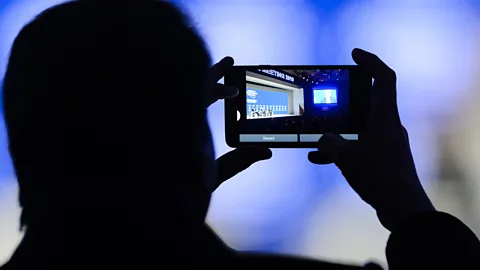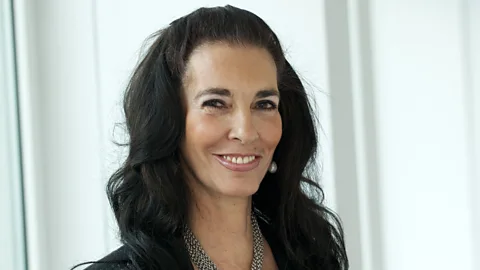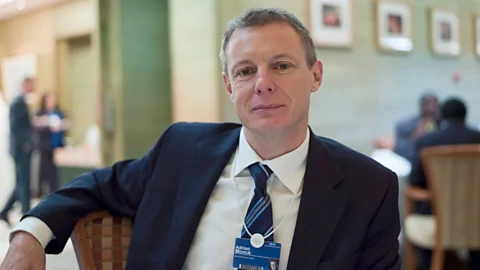How two iPads and a smartphone became the new normal
 Getty
GettySo long laptop. Goodbye pen and paper. At Davos, multiple small devices — including the BlackBerry — are in the hands and pockets of most executives. A look at what people carry.
They’re in charge of multi-billion-dollar companies, running countries and investing millions all over the world. They can never be out of touch and must be ready to work at a moment’s notice. So what technology do the Davos denizens rely on to stay productive on the go?
Anne Richards, chief investment officer of global investment management group Aberdeen Asset Management, has given up entirely on her laptop and instead uses two iPads. “I find the phone a bit small. Apps are also better on iPad. I haven’t used a laptop in years.”
Like many attending Davos, she is constantly on the road and can go upwards of a week without using any other means of working. But why two iPads? “I can be working on a document or keeping a market screen open on one, for example, and keeping track of emails on another without having to switch.”
Many people I spoke with use iPhones and iPads constantly. Orit Gadiesh, chairman of global consulting firm Bain & Company, for instance, said she uses her iPhone and iPad most frequently to stay connected.
 Bain & Company
Bain & CompanyOrit Gadiesh, chairman of Bain &Co.
“My life can be a blur of planes, trains and automobiles,” said Jim Moffat, Deloitte Global Consulting Business Leader. “My iPhone is essential ― whether it’s quick email replies to clients and colleagues, or text chats keeping me connected to family.” He admits that’s not the only reason. “I keep hoping it might also make me social media savvy enough to impress my three Millennial kids.”
What about Adrian Monck, the World Economic Forum’s head of public engagement and foundations – essentially the guy responsible for all of the WEF’s communication and public outreach? Surely he needs something more than a smartphone on what is likely the busiest week of his year? Nope.
“(My) iPhone6 Plus has everything,” he said.
Beginning to sense a trend? “(I have my) mobile (phone) to keep the end of day inbox disaster to a minimum, iPad to keep all my notes together and ensure proper sharing with my team," said David Boehmer, the global managing partner of financial services for executive search firm Heidrick & Struggles. But even he takes his commitment to digital one step further than many executives: “I no longer have pen nor paper.”
 World Economic Forum
World Economic ForumCall me old fashioned, but I still like to write with a pen and paper sometimes, and judging from a careful look around the Congress Centre, I’m not alone. I wrote much of this story with a pen and paper, but with a twist. I brought along a Livescribe pen – a smart pen that digitally records everything you write on their special dotted paper and then saves it to an application on your phone, where it can be automatically transcribed into type. It also lets you make an audio recording that is synched with the text. People were pretty surprised when I revealed it wasn’t your average ballpoint, and everyone who tested it out was pretty amazed.
Lest you think that everyone at Davos has an iPhone, I should note the gathering boasted the largest collection of BlackBerries I’ve seen in one place. A lot of people had two phones: a BlackBerry for work and an iPhone or Android phone for personal use. The consensus from those I spoke to seemed to be that companies still like the security of the BlackBerry, and its users really like the keyboard.
Also, anyone I met who had to do thoughtful or more detailed work, or had to write a lot, like journalists, did still tote a laptop. I strolled into the Microsoft café, and almost everyone who had stopped in for a snack and fast Wi-Fi was working on a laptop.
Advances in cloud computing and more sophisticated powerful mobile devices made travelling light possible. Being able to take notes, edit documents, access shared calendars, and read attachments to emails on phones that are essentially mini computers was one major factor. Being able to pick any device, be it tablet, laptop, or desktop, and carry on working or accessing data seamlessly made the switch to small mobile devices a reality this year at Davos.
Lucy Marcus is an award-winning writer, board chair and non-executive director of several organisations. She is also the CEO of Marcus Venture Consulting. Follow her Davos coverage for BBC Capital here and on Twitter @LucyMarcus.
